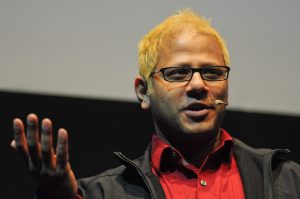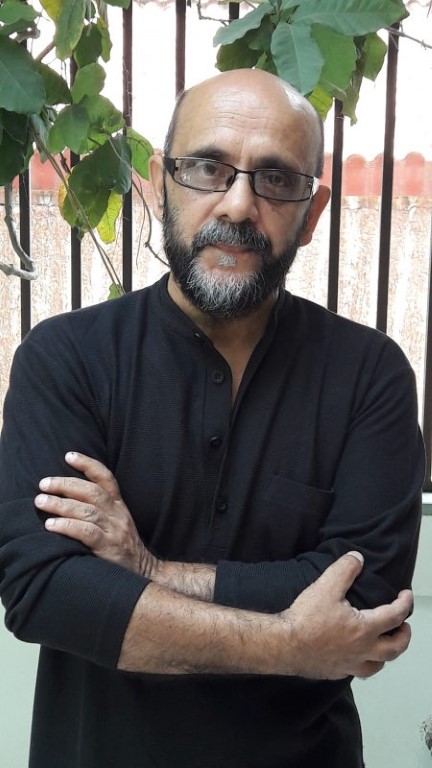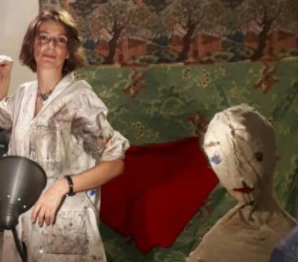Perhaps who better to chronicle this reality than a Bangladeshi-born American interdisciplinary media artist, who was born in bustling industrial Rangpur, and raised in the city of skyscrapers and the immigrant dream across the seas, New York.
This artist, 50-year-old Hasan Elahi, also has what one may call a rather alarming and unique ‘origin story’ for his fascination and inspiration with a niche genre.

Courtesy- Wikimedia Commons
Two decades ago in 2002, a year after the Twin Towers of the World Trade Center came down in The Big Apple during the historic 9/11 attacks, Elahi’s name was added (by mistake) to the US government’s watch list after an erroneous tip called in to law enforcement authorities.
It reportedly started when he — an academic and frequent traveler — was detained at Detroit airport when he stepped off a flight from the Netherlands. Months of interrogations and an intensive investigation by the Federal Bureau of Investigations (FBI) followed in this wake, leading to what can only be described as a harrowing experience for Elahi.
He was eventually told by FBI agents that they’d been ‘informed’ that he was hoarding explosives in a Florida storage unit. Lie detector tests finally convinced them that he wasn’t their man. Elahi was cleared of suspicions — and yet advised to keep the FBI informed of his whereabouts. Remember, once you’re on this terrorist watch list, it’s not easy to check out.
Elahi used to and still logs tens of thousands of air miles a year attending conferences and exhibiting artwork. It was, indeed, probably just a matter of time till he got hauled in again, or even ‘renditioned’ to some black site, he figured.
Elahi chose to comply not by submitting meekly, but by instead audaciously opening up his entire life — quite literally.

A collection of snapshots Hasan Elahi took of his daily life on view at the Open Society Foundation (images courtesy Hasan Elahi)
Courtesy- HyperAllergic“Tracking Transience” was conceived. It “predates the National Security Agency’s (NSA) PRISM surveillance program by half a decade… the project questions the consequences of living under constant surveillance and continuously generates databases of imagery that tracks the artist and his points of transit in real-time”, writes the University of Colorado Boulder’s official bio page for Elahi.
It was a flood of mundane information — Elahi had decided to turn the tables by constantly calling and emailing the FBI to notify them of his whereabouts, but this turned into an open-ended art project.
What exactly was it? Starting as a droll practicality, it led to Elahi posting photos of his minute-by-minute life online (hotel rooms, airports, meals, receipts, bathrooms, etc). He also tracked himself on Google Maps, releasing communication records, banking transactions, transportation logs, and more. What began as created for the FBI agent assigned to him was also available to the public to monitor all intimate aspects of his life.

Courtesy- Wikipedia
Various intelligence and government agencies have been confirmed visiting his website — his server logs show hits from the Pentagon, the Secretary of Defense, and the Executive Office of the President, and others. On his site, you’ll find over 20,000 images stretching back three years. It is written that: “Elahi has documented nearly every waking hour of his life… He posts copies of every debit card transaction, so you can see what he bought, where, and when. A GPS device in his pocket reports his real-time physical location on a map.”
He hasn’t been detained since — yet.
In essence, Elahi the artist has explored in depth the social implications of technology and media via art. His work is layered and chaotic, yet systematic and chilling in its undertones and overtures. It embraces the digital world and the receptacle it forms around us, while making indirect commentary about power systems. In appreciation of his unique perspective, he has a long list of plaudits to his name.

Elahi has served as an associate professor of Art at University of Maryland — interestingly, an institute roughly equidistant from the FBI, NSA and Central Intelligence Agency (CIA) headquarters. He was also professor and director of the George Mason School of Art at George Mason University.
His work has been presented in numerous exhibitions at venues such as SITE Santa Fe, Centre Georges Pompidou, the Sundance Film Festival, the Gwangju Biennale, and the Venice Biennale.
In July 2022, he was set to take over as dean of the College of Fine, Performing and Communication Arts (CFPCA) in Detroit, appointment unanimously approved by the Wayne State University Board of Governors.
He has also served as faculty at Rutgers University, New Jersey, San Jose State University; Rutgers; the University of South Florida in Tampa, Florida; West Virginia University; Wanganui School of Design, in Wanganui, New Zealand; and also in Houston, Texas. He is part of the core faculty at the Chautauqua School of Art summer residency programme.
Elahi has spoken about his work to a broad range of audiences such as Tate Modern, Einstein Forum, the American Association of Artificial Intelligence, the International Association of Privacy Professionals, TED, and the World Economic Forum.





